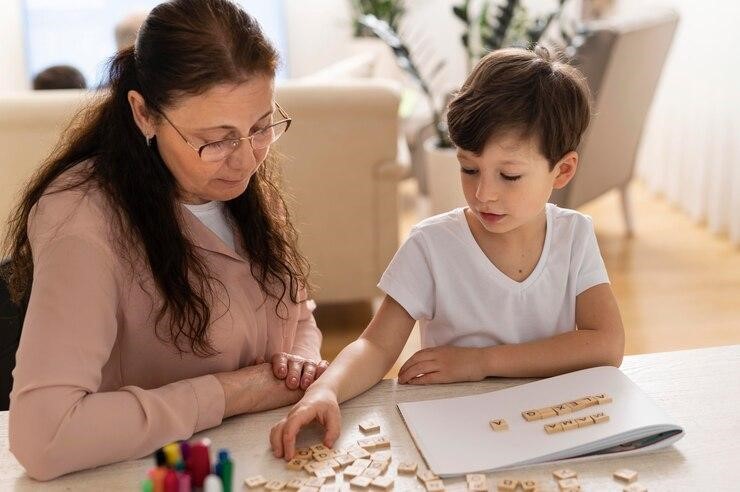
Image Source: freepik.com
Welcome to the world of autism education, where a spectrum of learning opens up new opportunities for individuals on the autism spectrum. From tailored teaching methods to specialized programs, understanding education for autism is crucial in supporting the unique needs of these learners.
In this article, we delve into the intricate realm of educating individuals with autism. We explore the various approaches and strategies that educators, parents, and professionals employ to cultivate an inclusive and supportive learning environment.
What is autism?
Autism, or autism spectrum disorder (ASD), is a neurodevelopmental disorder that affects communication, social interaction, and behavior. It is characterized by a range of symptoms and challenges that vary from person to person. Individuals with autism often have difficulty with social communication, sensory processing, and repetitive behaviors.
Different Types Of Autism Spectrum Disorders (ASDs)
Autism is a spectrum disorder, meaning it encompasses a wide range of symptoms and abilities. There are different types and subtypes of autism spectrum disorders, including autistic disorder (classic autism), Asperger syndrome, pervasive developmental disorder-not otherwise specified (PDD-NOS), and childhood disintegrative disorder. Each subtype has its own unique characteristics and challenges.
The Importance Of Education For Individuals With Autism
Education plays a crucial role in the lives of individuals with autism. It provides them with the necessary skills, knowledge, and support to navigate the world around them. Education helps individuals with autism develop their social, communication, and cognitive abilities, empowering them to lead fulfilling and independent lives.
Challenges Faced By Individuals With Autism In Traditional Educational Settings
Traditional educational settings can present various challenges for individuals with autism. These settings often prioritize conformity, socialization, and rigid learning structures, which may not align with the unique needs and learning styles of individuals with autism. Sensory overload, difficulty with social interactions, and limited attention spans can make it challenging for individuals with autism to fully engage and participate in traditional classrooms.
The Benefits Of Specialized Education For Autism
Specialized education tailored for individuals with autism offers a myriad of advantages. These programs are meticulously crafted to address the specific requirements of students with autism, fostering a supportive and customized learning atmosphere. Specialized education places emphasis on honing skills crucial for daily life, including communication, social interaction, self-regulation, and academic prowess. Furthermore, these programs integrate evidence-based practices and strategies, such as ABA CMS, which have proven efficacy in facilitating learning and development among individuals with autism.
Different Approaches And Methods Used In Autism Education
Autism education utilizes a range of approaches and methods to support learning and development. Applied Behavior Analysis (ABA) is a widely used approach that focuses on behavior modification and skill development. Structured teaching, visual supports, and social stories help individuals with autism understand and navigate daily routines and social interactions. Sensory integration therapies aim to address sensory sensitivities and promote self-regulation. Assistive technology, such as communication devices and educational apps, can enhance learning opportunities for individuals with autism.
Inclusive Education For Individuals With Autism
Inclusive education aims to provide individuals with autism the opportunity to learn alongside their neurotypical peers in a mainstream classroom. Inclusive classrooms embrace diversity and promote acceptance, creating an environment where all students can thrive. Accommodations and modifications are made to the curriculum, teaching strategies, and classroom environment to support the learning needs of students with autism. Inclusive education fosters social interaction, peer support, and a sense of belonging for individuals with autism.
Support Services And Resources For Individuals With Autism In Educational Settings
Educational settings offer a range of support services and resources for individuals with autism. These may include speech therapy, occupational therapy, counseling, and specialized instruction. Individualized Education Programs (IEPs) are developed to outline specific goals, accommodations, and services for students with autism. School-based support teams, such as special education teachers and ABA therapists, collaborate with educators and parents to ensure students with autism receive the necessary support to succeed academically and socially.
The Role Of Parents And Caregivers In Supporting Education For Autism
Parents and caregivers play a vital role in supporting education for individuals with autism. They are advocates for their children, working closely with educators and professionals to ensure their child’s unique needs are met. Parents and caregivers can provide valuable insights into their child’s strengths, challenges, and preferences, helping to shape individualized education plans. They can also provide support at home by reinforcing learning, promoting independence, and fostering a positive and nurturing environment for their child.
Conclusion
Education for individuals with autism is a complex and multifaceted endeavor. Understanding the unique needs and strengths of individuals on the autism spectrum is essential in creating inclusive and supportive learning environments. From specialized programs to inclusive classrooms, education offers a pathway for individuals with autism to reach their full potential. By embracing innovative approaches, leveraging support services, and involving parents and caregivers, we can ensure that education for autism is not only effective but also empowering. Let us continue to explore and implement strategies that enhance the educational experiences of individuals on the spectrum, fostering a future of limitless possibilities.
